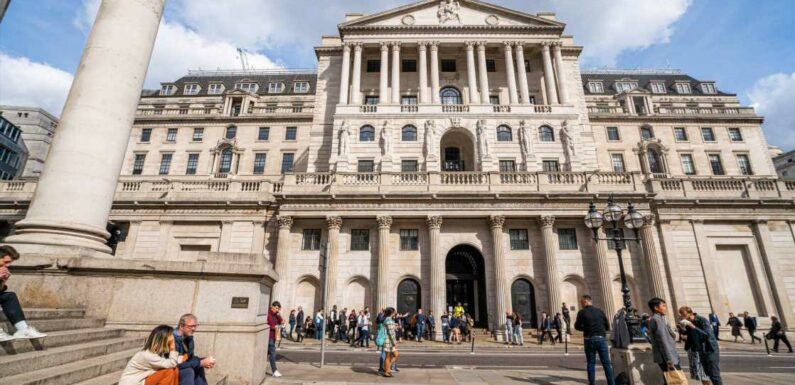
HOMEOWNERS are facing soaring mortgage costs after the Bank of England hiked interest rates to 3% today.
The Bank of England increased the base rate of interest by 0.75 percentage points – the biggest hike since 1989.
The Monetary Policy Committee made a decision that will push up the amount that millions of mortgage holders have to pay their banks every month.
The Bank of England also warned that the UK could be on course for its longest recession since reliable records began a century ago.
It comes as households are already being battered by the soaring cost of living – with food and energy bills on the rise.
The Bank has acted to increase interest rates to try and put a lid on runaway inflation.
READ MORE IN MONEY
What is the Bank of England base rate and are interest rates going up?
Millions of mortgage bills to rise as Bank of England hikes rates again to 3%
It does not think rates will have to rise as high as the 5.2% expected by markets.
And any rise to interest rates is a worry for the 1.5million homes on tracker mortgages, whose payments will soar by an average £880 a year.
Alice Haine, personal finance Analyst at Bestinvest, said: "Naturally, a 75 basis point increase in the base rate is another blow for mortgageholders who are already grappling with the reality of higher borrowing costs following more than a decade of ultra-low interest rates."
What the rate rise means for mortgages
Anyone on a variable or tracker mortgage will be the first to feel the effects of the increase.
Most read in Money
Millions of mortgage bills to rise as Bank of England hikes rates again to 3%
Celebrations makes major change to tubs – and it will divide all chocolate fans
Brits baffled by new build’s security gate – can you spot the massive flaw?
Exact date millions will get £324 cost of living payment direct to bank accounts
And around 800,000 homeowners on a tracker mortgage directly linked to the base rate will see an immediate rise.
Exactly how much more your bill will depend on the type of mortgage you have.
These mortgages are linked to the Bank's base rate – so when it goes up, so do your monthly repayments.
The average mortgage holder on the standard variable rate (SVR) will also see their payments rise by £1,476 a year, according to Hargreaves Lansdown.
This will mean that a household with a £250,000 mortgage over 25 years on the average SVR rate of 5.4% will see their monthly payments increase by £123.
The bigger your mortgage, the more your repayments will go up when interest rates rise.
While those locked into fixed-rate deals are protected for now, higher interest rates mean they face a huge jump when they come to remortgage.
Around 2.2million borrowers are due to come to the end of a deal that they fixed when the base rate was at a historic low of 0.1%.
On a fixed deal you lock in a rate for a certain period of time which keeps payments the same.
What to do now
Mortgage lenders are quick to react when interest rates rise and will usually pull their cheapest deals fairly quickly.
If you are currently on a variable or tracker mortgage rate then it's too late to do anything to beat today's hike unfortunately.
But some experts say that rather than panicking and locking in a rate in the days after the hike, you might be able to get a better deal in a couple of weeks when the market has calmed down.
Either way, locking into a fixed rate deal will give you certainty over your repayments for a set period of time and protect you from future rate hikes.
Shopping around for a mortgage deal yourself can be complicated, but an independent broker will be able to help.
Read More on The Sun
I’m a tatted up dad & took my baby to get his first ‘inking’ – people slam me
I’m a savvy mum…I’ve got my son a huge Christmas present haul with 50p bargains
If you are struggling to meet monthly repayments then extending your mortgage term can make them more affordable – but it will mean you end up paying more interest over the long-term.
First-time buyers should be sure to take advantage of the Lifetime Isa, which gets you a 25% bonus from the government on money you save for a house deposit.
Source: Read Full Article







